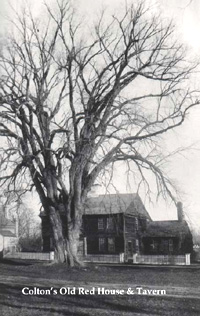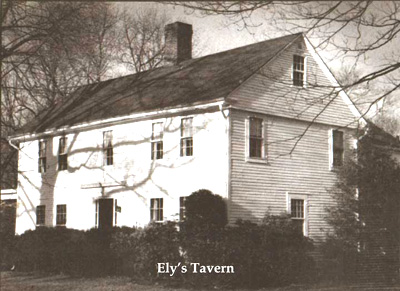

|
Right on the heels of the building of the "Old Church on the Green" came the Revolutionary War. During this period, which Rev. Williams referred to as one of "tumults and uneasiness", many Longmeadow residents went off to war. Even to today, many of the town's historic homes are marked with an "M" to designate the presence of Minutemen. The number of asterisks indicates their number. Other homes which housed Revolutionary War veterans were decorated with a star.
The Thomas Bliss II House, built around 1714, was purchased by Nathaniel Ely in 1758 and converted to a tavern. It remained a tavern until 1833, nearly eighty years. Captain Simon Colton built the "Old Red House" about 1734. Standing a bit southeast of the meetinghouse, it was kept by him as a tavern during the Revolution. Ely's Tavern stood on the other side of the street, just to the north. |
||||||||||||||||||||
 |
||||||||||||||||||||
 |
||||||||||||||||||||
|
By this point in time, Longmeadow Street (still known as "The Country Road") lay right in the path of the Boston-New York Stage route. As a result, it has been speculated that many, many soldiers may have sought refuge and comfort in these wayside inns. The Green itself found itself to be a frequent camp-ground for the militia. It was a dynamic place, with a constant influx of new people, as others left for battles as far away as Lexington and Concord. Although there is no concrete evidence to support the theory, it is highly probable that George Washington himself passed through Longmeadow when going back and forth between Massachusetts and Connecticut. One of our town's "Publick Houses" may have supplied him with refreshment! The following brief excerpts out of Dr. Williams's diary offer us a first-hand view into the state of the community during these tumultuous times of change: "April 15, 1775 - By the accounts brought by the post, things appear more threatening. The court at home seems determined to treat us as a people in rebellion. Great uneasiness in the nation. April 20, 1775 - This morning as soon as it was light, the drum beat and three guns were fired as an alarm. The story is that some of the troops had marched from Boston to seize some military stores in Lexington, or Concord, and that some men had been killed, but the accounts are vague - we must wait. The Lord mercifully prepare us for the tidings we may have. The minute men are gone to town and men are collecting from various parts, and we have reason to fear that much mischief is done. April 21, 1775 - This morning at 4 o'clock another message is come advising that there has been a smart engagement at Concord between the regulars and our people, and many killed, but we have an uncertain amount. 'Tis said houses are burnt, and women and children killed - sad work, indeed - more men are collected and going forth. This day we met together for prayer in the meeting house and I offered some remarks from the third chapter of Jonah." Rev. Williams's entry the next day, April 22nd, revealed more information of this now-famous battle, and concluded "thus a war is begun". The following year…. "April 9, 1776 - I hear of tumults and disorderly practices, stupidity, hardness of heart, atheism, and unbelief prevail. The British Ministry breathes out cruelty against the colonies still. Things look darker and darker. July 24, 1776 - A number of people have gathered together, some dressed like Indians with blankets, and manifested uneasiness with those that trade in rum, molasses, sugar, etc. I understand that a number went to Merchant Colton's and have again taken away his goods…..I am fearful of special troubles in this place, not only on account of Samuel Colton's goods, but also because several of our people are going into service in Connecticut, and so our quota will be deficient, and possibly men will be drafted." Thus, everything war did not end on July the fourth. On the contrary, accounts of dark days and death fill Dr. Williams' diary for the months to follow. His entries for early December, 1776 shows a new area of concern: "Our soldiers begin to return that enlisted for a stated time, and people seem engaged to get money, and I fear by oppression and unjust measure. Reported a large fleet appears before New London. People are in a fright and the Connecticut militia flocking down to New London." Reverend Williams, "being required thereto by the Provincial Congress", conducted a complete and exhaustive reading of the Declaration of Independence from his pulpit, and upon the war's end, his diary describes "Great rejoicing in town; great guns fired; bells
rung; rockets played at ye Court- |
||||||||||||||||||||
|
AFTERWORD - Up to this point in our cursory look backwards, we have viewed the earliest community of Longmeadow basically as a faceless mass; and have watched the response of the group as a whole to changes and challenges in the world surrounding it. Perhaps their remarkable cohesiveness as a group was instrumental in their survival in the face of floods, hostile Indians, weather, and the entire host of challenges that rattle our worlds…even today. Despite the presence of various deeds, treaties, and other documents, it was the diary of Dr. Stephen Williams that finally gave a true human voice to the history of the community, and its spirit. Thanks to the technology we have at our disposal, as well as our fine Longmeadow website, Dr. Williams' observations, and the story of our little town, can be readily accessed throughout the Free World. One can hope that this "Boy Captive of Old Deerfield" would be greatly pleased at the thought of this; and Somewhere, there is great rejoicing, bells ringing, and taverns illuminated! |